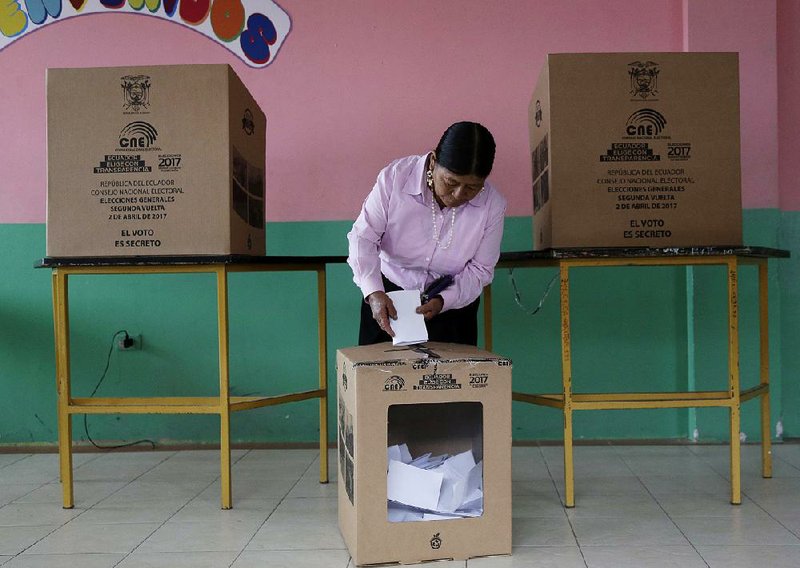QUITO, Ecuador -- Ruling-party candidate Lenin Moreno looked headed to victory in Ecuador's presidential runoff Sunday but his rival refused to recognize the results, claiming he was the victim of fraud in what could set the stage for protests in the historically turbulent Andean nation.
The election in the tiny Andean nation of 16 million was being watched closely for whether it marked a comeback for leftist candidates after a string of right-wing victories across Latin America.
With almost 96 percent of the vote counted, the National Electoral Council said Moreno won 51 percent of votes to banker Guillermo Lasso's 49 percent. A difference of 214,000 votes separated the two candidates with about twice that number of votes still left to count.
Lasso demanded a recount after three exit polls showed him winning. He also questioned why results that took three days to calculate after the first round of voting in February were announced so quickly in Sunday's runoff.
"This is very sickening, we're not going to allow it," said Lasso, who called on supporters to protest the results peacefully but firmly.
"They've crossed a line, which is pretending to abuse the people's will" and install an "illegitimate" government, Lasso said.
So far the only evidence of possible fraud presented by Lasso's campaign are the results in one tiny provincial voting center that it said were reversed when they were reported to electoral authorities in Quito.
Thousands of angry Lasso supporters shouting "fraud" broke through metal barricades and almost reached the entrance of the electoral council's headquarters in Quito before being pushed back by police. A similar scuffle took place outside the electoral offices in Guayaquil.
Moreno on Sunday had urged supporters to wait for official results that he said would confirm his "triumph." The former vice president had led a contentious first-round election on Feb. 19, where the 64-year-old fell just short of the required threshold to avoid a runoff.
Lasso, 61, had bet that frustration over Ecuador's sagging economy and President Rafael Correa's heavy-handed style would lift him to an upset win.
Left-wing populists such as Correa used the commodity boom earlier this decade to cut poverty and cultivate support, but the region has suffered as prices for oil and other exports continue to slump. Analysts expect Ecuador's economy to shrink by 2.7 percent this year.
The change in fortunes has tilted Argentina and Peru to the right, and many leftists saw the mild-mannered Moreno as their best chance to break the rightward trend.
Moreno's campaign, led by Correa, cast Lasso as a wealthy, out-of-touch politician who profited from the country's 1999 banking crisis. Moreno was shot in a 1998 carjacking, and he is the first candidate in a wheelchair to win a presidential race in Latin America.
"We know how to put ourselves in your shoes, understand your dreams and wishes," Moreno said in a final campaign announcement.
Lasso put forward a pro-business agenda aimed at attracting foreign investment, reducing taxes and generating more jobs. In recent days he drew comparisons between continuing a Correa-style government and going down the same path as socialist Venezuela, which is so economically crippled that the average Venezuelan shopper now spends 35 hours a month waiting in line.
After casting his ballot in his native Guayaquil, Lasso said he voted "for change, so Ecuador can recover its freedom."
Election observers from the Organization of American States, the Union of South American Nations and other groups are in Ecuador to help defuse any tensions over the close race.
Information for this article was contributed by Nick Miroff of The Washington Post and by Gonzalo Solano and Joshua Goodman of The Associated Press.
A Section on 04/03/2017

